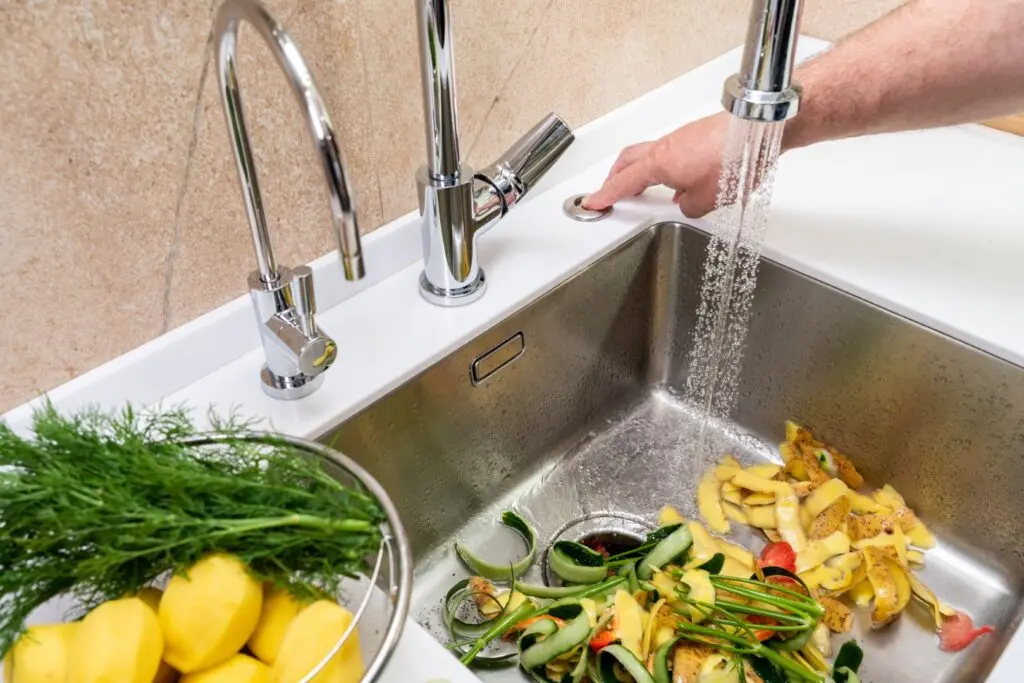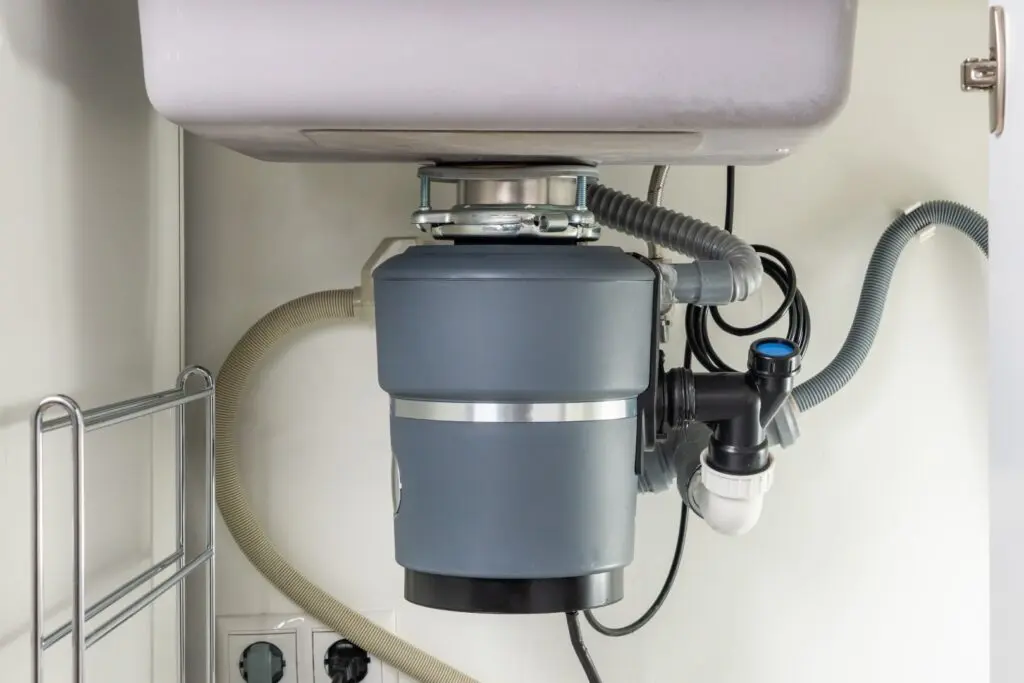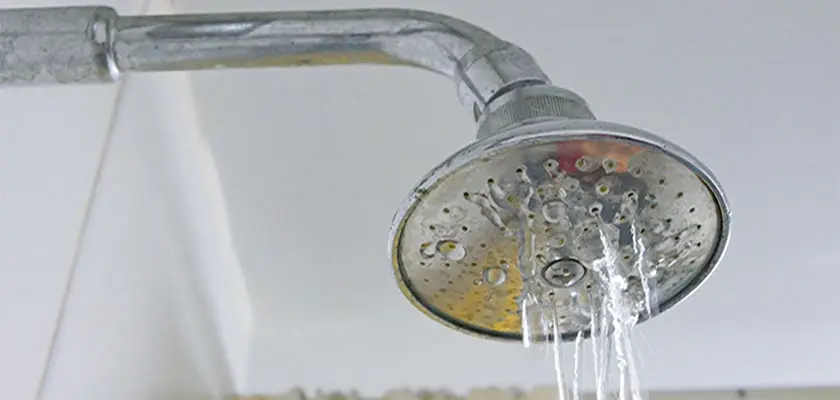
If you’ve never had a garbage disposal before, you’re in for a treat. Garbage disposals are an incredible appliance, reducing the amount of biodegradable food waste that winds up in your trash, also making cleanup before and after meals a breeze.
As with any appliance, garbage disposal maintenance is important for ensuring it works properly and lasts as long as possible. This guide covers everything you need to know about using your garbage disposal and keeping it working at its best.
Using a garbage disposal is fairly straightforward.
It’s important that you always run your garbage disposal with cold water when you grind food scraps. This helps everything flow down your drain pipes more easily. Hot water, on the other hand, can lead to waste buildup and clogs.
Occasionally, your garbage disposal may stop working without warning. In most cases, it just needs to be reset.
This is due to the triggering of a safety system that works a lot like a GFCI outlet. When this safety system is set off, it causes a small button on the unit to pop out. To get it working again, you simply need to press this button.
To find the button:
A frequent need to manually reset the unit could be a sign your garbage disposal is dying. If you’re having problems with your garbage disposal and already have home warranty coverage, it’s important to submit your claim.
Don’t have a home warranty? Get an instant quote from one of the most trusted names in the business.
The food waste your garbage disposal can grind varies based on your make and model. However, for the most part, all garbage disposals will have no trouble handling things like fruits, vegetables, and meats.
You can even put ice cubes or citrus peels into your disposal to aid cleaning and deodorization.
Some brands – including InSinkErator and Waste King – can safely take on tougher food waste, including small bones and fruit pits. Read your garbage disposal’s manual to learn more about your unit’s capabilities.
While there’s plenty of food waste your garbage disposal can handle, there are a few things to avoid sending down the drain.
While it may seem like common sense, it bears repeating. Non-food waste should never go down the drain. This includes plastic packaging, aluminum cans, disposable coffee cups, and kitchen sponges.
Essentially, if it’s not food waste, take that as a sign to keep it out of the disposal.
Grease, fat, and cooking oils should never be sent down your garbage disposal. These materials can build up and clog pipes over time. This can lead to some terrible, expensive damage that’s not worth the trouble.
To dispose of fats, oils, or grease:
Of course, some people like to freeze leftover fats and grease for use in future cooking recipes. That’s completely up to you!
While not a hard “never,” anyone planning on grinding up fibrous foods, such as celery, kale, asparagus, corn husks, or artichoke leaves, should check the capabilities of their model beforehand.
While some of the more “premium” models can take on these materials, the stringy nature of fibrous foods can lead to clogs in the machinery for those not prepared to handle them.
While eggshells may be safe to grind infrequently, it’s best to avoid grinding them at all. They’re unlikely to harm the disposal. However, due to how long it takes eggshells to decompose, it’s easy for them to build up in your pipes over time, especially if you’re grinding a lot of them.
Much like eggshells, coffee grounds are unlikely to harm your disposal, but they can build up and clog your drains over time. For the sake of your plumbing, avoid sending coffee grinds down the drain.
It’s a bad idea to send crab, lobster, clam, and oyster shells down your drain. Like eggshells and coffee grounds, they simply won’t decompose quickly and can cause serious problems for your home’s plumbing down the road.
Never pour corrosive, caustic chemicals down your disposal. They can be terrible for the device and cause serious damage over time. This includes bleach, drain cleaners, and similar products. When it comes to cleaning your disposal, stick with more natural cleaners.
Popular options that are safe for cleaning garbage disposals include baking soda and vinegar.
Looking for cleaning tips? When it comes to cleaning your garbage disposal, there’s a bit more to it. Check out our guide on how to clean your garbage disposal.
Beyond a sink stopper and splash guard, there’s not much else you’ll need to use your garbage disposals. At the end of the day, they’re relatively low maintenance. Just clean them regularly and watch what you send down the drain. Hopefully, you’ll get a very long life out of your appliance.
Sadly, even the most carefully maintained appliances won’t last forever. Unexpected issues do occur, and sometimes there’s little you could have done to prevent it.
To protect yourself, consider investing in a home warranty. Select Home Warranty has coverage plans that cover kitchen appliances, including garbage disposals, greatly reducing your financial burden in the case of a malfunction or breakdown.
A home appliance warranty is a great value, with garbage disposal coverage safeguarding all components, parts, and modules necessary to a garbage disposal’s functionality.
If you don’t have a home warranty already, rest assured, it’s super easy and a great value. Getting a free quote only takes a couple minutes. Follow the link below or call us at 800-670-8931.

Don’t wait until it’s too late! Check out our current plans and get your free quote.

Household Tips
If you’re tired of dealing with rotting food and excess waste, a garbage disposal is perfect for your kitchen. A garbage disposal is an easy-to-use appliance that will save time..

Home Warranty
Whether you purchased one yourself or were grandfathered into it when you bought your house, there comes a time when you must renew your home warranty to continue coverage. When..

Household Tips
One day you might take a shower, and the next you might run the bath. For everyone with a combination shower and bathtub, this is a choice we don’t expect..